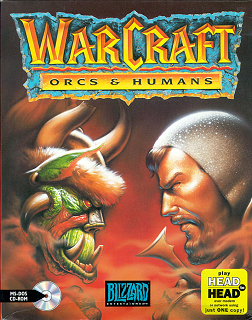
Warcraft: Orcs & Humans is a real-time strategy game (RTS) developed and published by Blizzard Entertainment, and published by Interplay Productions in Europe. It was released for MS-DOS in North America on 15 November 1994, and for Mac OS in early 1996. The MS-DOS version was re-released by Sold-Out Software in 2002.

Earthworm Jim is a 1994 run and gun platform game developed by Shiny Entertainment, featuring an earthworm named Jim, who wears a robotic suit and battles the forces of evil. The game was released for the Sega Genesis and Super Nintendo Entertainment System, before being subsequently ported to a number of other video game consoles.

Dungeon Keeper 2 is a strategy game developed by Bullfrog Productions and published by Electronic Arts in 1999 for Microsoft Windows. The sequel to Dungeon Keeper, the player takes the role of a 'dungeon keeper', building and defending an underground dungeon from the would-be heroes that invade it, as well as from other keepers. In the campaign mode, the player is charged with recovering the portal gems from each area in order to open a portal to the surface. The player can also construct a dungeon without strict objectives, and multiplayer is supported over a network.
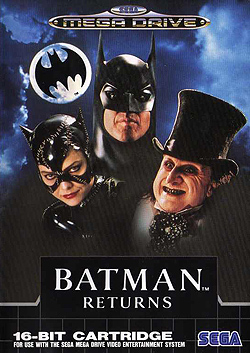
Batman Returns is the name of several video games for various platforms based on the 1992 film of the same name.
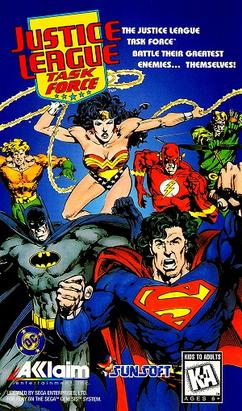
Justice League Task Force is a competitive fighting game produced by Sunsoft and distributed by Acclaim for the Super Nintendo Entertainment System and Genesis in 1995. The Super NES version was co-developed by Blizzard Entertainment and the Genesis version by Condor, Inc..

Shining Force II is a tactical role-playing game for the Mega Drive/Genesis console developed by Camelot Software Planning in 1993. Its storyline is not directly connected to the original Shining Force, although a Game Gear title Shining Force Gaiden: Final Conflict links the two games' plots.

The Horde is a hybrid action-strategy video game that was originally released for the 3DO Interactive Multiplayer and was ported to the Sega Saturn and DOS. It also featured full-motion video sequences featuring a number of actors including Kirk Cameron as Chauncey and Michael Gregory as Kronus Maelor. Video sequences were reduced to slide shows in some versions.

Lufia & the Fortress of Doom, known as Estpolis Denki in Japan, is a role-playing video game developed by Neverland and published by Taito in 1993, for the Super Nintendo Entertainment System. It is the first title in the Lufia series of video games and the only game from the series released under the Taito label in North America.

Disney's The Jungle Book is a series of platform video games based on the 1967 Disney animated film of the same name. The game was released by Virgin Interactive Entertainment in 1994 for the Game Boy, NES, Master System, Sega Genesis/Mega Drive, Sega Game Gear, Super NES, and PC. While gameplay is the same on all versions, technological differences between the systems forced changes – in some case drastic – in level design, resulting in six fairly different versions of the 'same' game. This article is largely based upon the Genesis version.
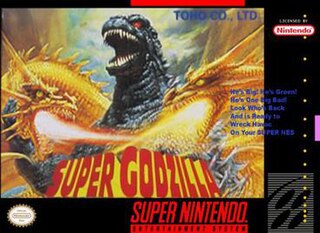
Super Godzilla is a video game for the Super Nintendo Entertainment System released in Japan on December 23, 1993, and in North America in July 1994. It is based on Toho's Godzilla franchise and was developed by Advance Communication Company.

The Lion King is a platform game based on Disney's 1994 animated film The Lion King. The game was developed by Westwood Studios and published by Virgin Interactive Entertainment for the Super NES and Genesis in 1994, and was ported to MS-DOS, Amiga, Game Gear, Master System, and Nintendo Entertainment System. The Amiga, Master System, and NES versions were only released in the PAL region. It is the final licensed NES game worldwide. The game follows Simba's journey from a young cub to the battle with his uncle Scar as an adult.

NHL 96 is a 1995 sports video game developed by EA Tiburon for the SNES, High Score Productions for the Sega Genesis, EA Canada for DOS, and Probe Entertainment for the Game Boy. EA Sports published all versions of the game except the Game Boy version, which was published by THQ. The game is based on the sport of ice hockey and puts the player in control of a hockey team in modes of play such as exhibitions, seasons and playoffs. It is the fifth installment in the NHL game series.

Mighty Morphin Power Rangers is the title of five different video games based on the first season of the television series of the same name, one for each of the following game platforms: Sega Genesis/Mega Drive, Super Nintendo Entertainment System, Game Boy, Game Gear, and Sega CD. The Nintendo versions of the game were released by Bandai, while the Sega versions were published by Banpresto, a pseudonym of Bandai. The Green Ranger is only playable on the Genesis and Game Gear versions of the game.

Sparkster is a side-scrolling platform game developed and published by Konami for the Super Nintendo Entertainment System. The game, the only one in the series to be released on a Nintendo console, was directed by Hideo Ueda and was released in Japan on September 1994, in North America in October 1994, in Europe in 1994.
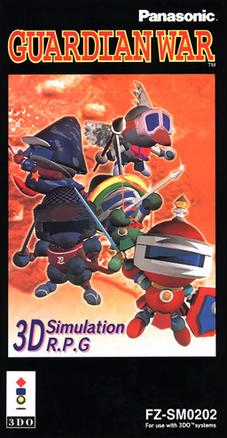
Guardian War is a console RPG or tactical role-playing game released for the 3DO console. It is notable for its use of 3-D animation which was uncommon for console RPGs at the time. It is also known as Powers Kingdom in Japan and Europe, and is one of the few 3DO games which is region-protected. This only applies to the PAL game and console. Both NTSC versions can play on both US and JP consoles.
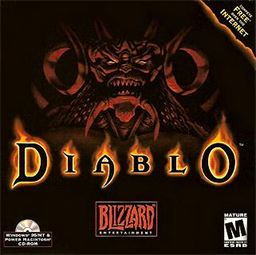
Diablo is an action role-playing video game developed by Blizzard North and released by Blizzard Entertainment in January 1997, and is the first installment in the video game series of the same name.

Samurai Shodown, known in Japan as Samurai Spirits, is a fighting game developed and published by SNK for the Neo Geo arcade and home platform. Released in 1993, it is the first installment in the Samurai Shodown series. In contrast to other fighting games at the time, which were set in modern times and focused primarily on hand-to-hand combat, Samurai Shodown is set in feudal-era Japan and was SNK's first arcade fighting game to focus primarily on weapon-based combat.

King of the Monsters 2 is a fighting/wrestling game released on May 5, 1992 by SNK. It is a sequel to the 1991 game King of the Monsters. In this game three of the previous game's surviving monsters return and battle across the Globe against giant alien monsters that threaten the Earth. The game was later ported to the Super NES and Sega Genesis by Takara.

Mortal Kombat is a fighting game developed and released by Midway in 1992. It is the first entry in the Mortal Kombat series and subsequently was released by Acclaim Entertainment for nearly every home platform at that time. The game focuses on several characters of various intentions who enter a martial arts tournament with worldly consequences. It introduced many key aspects of the Mortal Kombat series, including the unique five-button control scheme and gory finishing moves called Fatalities.

Fun 'n Games is a compilation video game developed by Leland Interactive Media and released for the Super NES and Mega Drive/Genesis platforms in 1993 and 1994. A game with the same name was released in 1995 for the 3DO Interactive Multiplayer, but it differs slightly in gameplay and was developed by Williams Entertainment Inc. The North American Super NES version of the game is considered to be one of the more rare games released for the console.


















